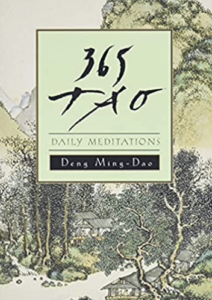The Tao is constantly moving, the path that all life and the whole universe takes. There is nothing that is not part of it—harmonious living is to know and to move with the Tao—it is a way of life, the natural order of things, a force that flows through all life.
365 Tao is a contemporary book of meditations on what it means to be wholly a part of the Taoist way, and in total harmony with oneself and the surrounding world.
Deng Ming-Dao is the author of eight books, including The Living I Ching, Chronicles of Tao, Everyday Tao, and Scholar Warrior. His books have been translated into 15 languages. He studied qigong, philosophy, meditation, and internal martial arts with Taoist master Kwan Saihung for 13 years, and with two other masters before that
On a daily basis, I read the inspiring 365 Tao Daily Meditations by Deng Ming-Dao to stay on a spiritual course. I have shared my enthusiasm about creating alters and prayer over the years.
Here is the passage from page 26:
Images on the altar,
Or imagined within:
We pray to them,
But do they answer?
Yes, wisdom keepers do stress the import of adoration so we dutifully kneel before altars, making our offerings and sacrifices. In our meditations, we are taught to view gods within ourselves and humbly pray to receive power and knowledge. We do so with sincerity until the masters say that there are no gods, then confusion sets in.
The statue on the altar is mere wood and gold leaf, but our need to be reverent is genuine. The god within may be just a visualization, but our need for concentration is real. The attributes of heaven are utopian conjectures, but the essence of these parables is real. The gods, then, represent certain philosophies and extraordinary facets of the human mind. When we devote ourselves to gods, we establish communion with these deeper aspects.
That we are worshipping symbolism may elicit some discomfort. After all, we are instructed to accept only the tangible, scientific and material. We doubt the efficacy of adoring the merely symbolic, and are confused when such reverence brings about genuine personal transformation. But worship does affect our feelings and thoughts. When a guru tells you that there are no gods, they mean that the key to understanding all things lies within each individual. External worship is solely a means to point within to the true source of salvation.
What do you think?

